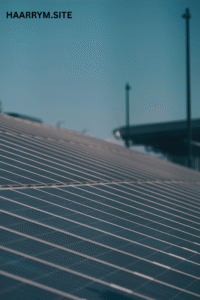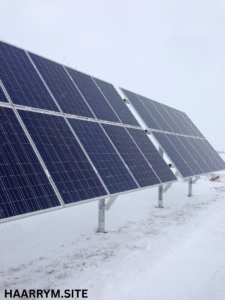
Many homeowners begin to question if solar panels function in winter when temperatures fall and snow covers roofs. The quick response is yes, solar panels do function in winter—and sometimes more effectively than one would think.
We will dispel common misconceptions about winter solar energy in this blog article, clarify how cold weather affects solar panel performance, and provide doable advice to help you optimize your solar investment all year long.
Solar Panel Mechanism
Let us first go with the foundations to grasp winter performance. Photovoltaic (PV) cells in solar panels translate sunlight—not heat—into energy. These cells direct current (DC) produce by absorbing photons from sunlight. From that DC energy, an inverter turns into useable alternating current (AC) power for your house.
Key Insight: Solar panels run on sunshine rather than heat, hence low temperatures do not always translate into lower energy output.
Can Solar Panels Perform in Winter?
Indeed, and in many situations they excel in cooler temperatures.
1. Cold Climate Increases Productivity
Unlike common wisdom, solar panels may operate more effectively in colder climates. Like most electronics, solar cells run more effectively when they are cold. Excessive heat may reduce panel performance, hence best conditions for solar generating are really those of brisk winter days with clear sky.
A degree Celsius change in temperature will cause efficiency to rise by 0.3% to 0.5%.
2. Availability of Sunlight Counts More
Not temperature; rather, solar hours define the primary restriction in winter. Shorter winter days and a lower sun angle imply less total sunshine exposure.
For instance, compared to June, December has less peak sunshine hours.
Still, panels produce electricity—just at lower levels—during gloomy or overcast days.
What About Snow on Solar Panels?
Snow accumulation becomes one of the main worries. After all, how might your covered solar panels generate electricity?
The fact is that while temporary snow cover sometimes melts or slides off rapidly, it may lower or impede production.
Mounted at an angle, solar panels let snow slide off as it melts—especially considering the additional heat from sunshine striking the panel.
Solar installers may advise greater tilt angles to promote snow shedding in areas with plenty of snow.
To let snow and rain slide-off more readily, some newer panels even include hydrophobic and anti-reflective coatings.
Winter Power Production of Solar Panels: How Much?
Depending on where you live, solar panels usually provide 30–50% less energy in the winter than in the summer. Still, they have great power.
Real-World Example: Though less than peak summer levels, homeowners in places like Colorado or New York, where winter sunlight may still be strong and clear, typically observe regular winter generation.
Five Winter Solar Stories: Discussed and Refuted
Let’s dispel some of the most often held false beliefs.
First myth: Solar panels cease operating in winter.
False is it. They just produce less because of fewer days and likely snow cover; they keep working.
Second myth: Solar panels cannot operate without heat.
Not heat; solar energy originates from sunshine.
Third myth: Snow permanently ruins solar panels.
Untrue. Most panels are designed to resist severe weather like snow and hail.
Myth 4: Installing solar is not worth it in a cold area.
Solar businesses abound in nations like Canada, Germany, and portions of the United States Northeast.
Myth five: A winter storm will render you powerless.
Dependents. Your electricity comes from many sources if you are hooked into the grid. Depending on storage, off-grid dwellings on batteries might have limited capacity.
Advice for Maximizing Winter Solar Performance
You may take actions to maximize the winter operation of your system even with little sunshine.
1. Keep Panels Free of Snow
Snow may be softly removed using a soft-bristled roof rake.
Use metal tools very sparingly as they may scratch the glass surface.
Usually, the sun melts snow organically; allow it some time.
2. Tilt Panels Steeper
In snowy conditions, tilt panels steeper to promote snow shedding and enhance winter solar exposure.
3. Clip Overhanging Trees
Make sure the lower-angled winter sun is not blocked by any extra shadow on your panels.
4. Track System Effectiveness
See daily production with your solar monitoring app.
See your installer if production looks off to look for equipment problems or obstacles.
5. Think About Battery Storage
Excess energy produced during the day may be stored in a solar battery and used at night or during a cloud cover.
Do Solar Panels Perform Under Winter Clouds?
Yes, but at less effectiveness. Though not as much as on bright days, solar panels still generate power during cloud cover.
On average, cloudy days provide 10–25% of solar panel normal production.
When skies clear in snowy areas, light reflecting off snow—known as the albedo effect—can actually improve panel performance.
Are Solar Panels Worth It in Cold Climates?
Surely. From the U.S. Northeast to Scandinavia, several cold-climates have strong sun acceptance. Even in cold, snowy areas, solar panels are a wise purchase with correct installation and a little winter upkeep.
Among such High-Solar Northern sites are:
-
Minnesota, USA
-
Ontario, Toronto, Canada
-
Germany
-
Norway
-
Vermont, USA
Last Thoughts: Are Solar Panels Suitable for Winter?
Indeed, solar panels operate rather well in winter. Although fewer days and snow might momentarily lower output, panels keep producing power and could even operate more effectively because of the cold.
If you reside in an area with severe winters, the secret to success is selecting premium panels, guaranteeing correct installation, and using periodic maintenance advice to keep your system functioning as it should.
Solar energy is a year commitment rather than just a summer fix.
Frequently Asked Questions (FAQs)
Q1: Should I install solar panels given my cold location?
A: Sure. Many places covered in snow have great annual solar performance. Make sure you get a reliable installation knowledgeable in winter optimization.
Q2: Should it snow, would I have to wipe my panels each time?
A: Not very necessary. Snow melts fast or slips off on its own quite a lot. Clean them just in case snowfall continues and productivity declines significantly.
Q3: Could a lot of snow harm solar panels?
A: Tested to industry standards for durability, quality panels are made to resist snow loads.
About Ready to Go Solar This Winter?
Whether you already own solar panels or are thinking about switching, knowing how your system performs in all seasons is crucial. Winter shouldn’t deter you; contemporary solar systems are designed for year-round operation.
